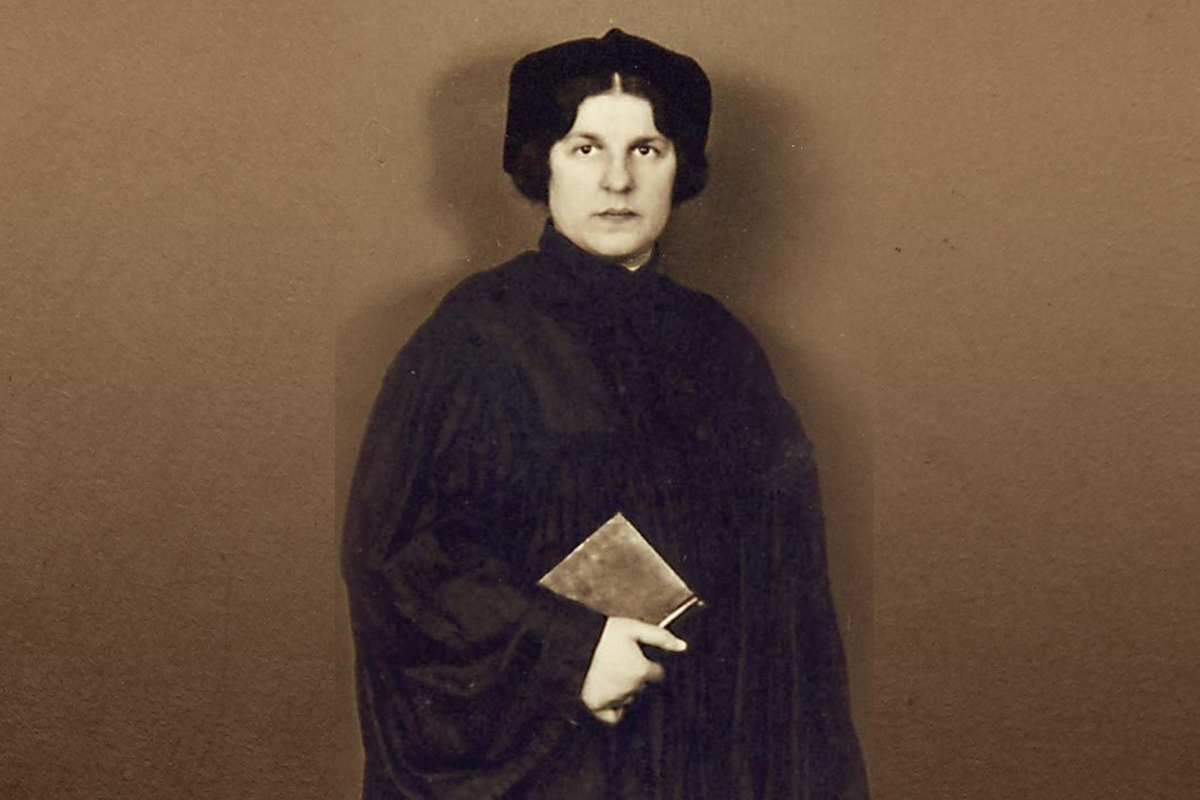
Regina Jonas
"To be 'blessed' by God means to bestow blessings, goodness and loyalty – regardless of place or situation."
These words were the last that Regina Jonas wrote down in Thereseinstadt before she was deported to Auschwitz. In the spirit of this quote, Regina was a rabbi and pastor in Theresienstadt for two years. She worked in the ghetto's "Department for Mental Hygiene" set up by psychoanalyst Viktor Frankl. Her job was to receive the traumatized deportees who came straight from the trains into the ghetto, ripped from normalcy and thrown into a terrifying new reality of overcrowding, sickness and despair. Regina offered them guidance and comfort, explaining the harsh realities that awaited them but assuring them that she would be there to offer her help to accompany them and to support them spiritually. In the harsh reality of the ghetto, she devotedly pursued her mission and fully exploited her potential as a spiritual shepherdess.
Even as a young girl, Regina Jonas wanted to become a rabbi. In an environment that knew no female rabbis, in which religious leadership was purely a male matter, Regina vehemently pursued her dream. With great determination and tenacity, she broke with convention and prejudice to pursue her religious vocation. In 1935, Regina Jonas became the first ordained female rabbi in history. But it had been a hard road.
Regina Jonas was born into a Jewish-Orthodox family in Berlin in August 1902 and grew up in poor conditions in the Scheunenviertel neighborhood. She attended the Jewish girls' school of the orthodox synagogue on the Rykestrasse, and excelled in all subjects related to Judaism, the Hebrew language and Jewish culture. Even then, she told other schoolmates that she wanted to become a rabbi.
At the beginning of the twentieth century, Jewish life in Germany underwent a change. A move away from strict orthodoxy towards a more liberal Judaism shook traditional foundations. Berlin was a center of Reform Judaism, which replaced the classical old rite with new traditions, often involving choral singing and accompanied by organ music in the synagogue. Even Orthodox communities began to adopt a more "modern" approach to Judaism, such as the Rykestrasse synagogue that Regina attended. It was founded by the moderate Orthodox Rabbi Dr. Max Weyl, who promoted religious education for girls and allowed bat mitzvah celebrations. This progressive atmosphere may have strengthened Regina in her quest to become a rabbi.
In 1924, she began her studies at the Berlin Academy for the Science of Judaism. Although she would have preferred an orthodox school, the liberal college was the only one that would consider training a woman to be a rabbi. Accordingly, she wrote her thesis on the subject: "May a Woman Hold Rabbinic Office?" It is a remarkable work, which shows not only Regina's vast knowledge of Talmudic and halachic subjects and texts, but also her total certainty and belief in herself. She wrote in conclusion:
"Except for prejudice and unfamiliarity, there is almost nothing halachically against the holding of the rabbinic office by a woman."
Even though Regina passed her thesis with distinction, trouble lay ahead. The professor responsible for her ordination, Eduard Barneth, died suddenly and his successor was too conservative to allow her to take her verbal rabbinate examination. But Regina never gave up: She continued to teach and learn and was finally ordained in 1935 by Liberal Rabbi Max Dienemann.
However, becoming a rabbi did not guarantee Regina a pulpit. She was not given a congregation of her own and continued to teach, speak in the more liberal synagogues, visit the sick and elderly in hospitals, and serve as a chaplain in the women's prison. When many of her male colleagues either emigrated or were arrested, she traveled to various communities across the country where Jews were left without religious leadership. Regina had dedicated herself to German Jewry, and could not think about leaving the Jewish communities she loved or exposing her elderly mother to the upheavals of exile.
Regina's life in Germany ended on 6 November 1942, when she was deported to the Theresienstadt ghetto. There, too, she continued the dedicated and selfless work she had begun in Germany with the elderly and sick. Her teaching activities did not stop in the ghetto, either. A document entitled "Lectures by the Only Female Rabbi Regina Jonas," contains 24 lectures given by Regina in the ghetto, including stories of Jewish women, as well as Talmudic, religious and biblical subjects. The final lines the rabbi captured on the document reflect her selfless attitude and commitment to those around her:
“Our Jewish people was planted by God into history as a blessed nation. ‘Blessed by God’ means to bestow blessings, lovingkindness and loyalty – regardless of place and situation. Humility before God, selfless love for His creatures, sustain the world. It is Israel’s task to build these pillars of the world— man and woman, woman and man alike have taken this upon themselves in Jewish loyalty. Our work in Theresienstadt, serious and full of trials as it is, also serves this end: to be God’s servants and as such to move from earthly spheres to eternal ones. May all our work be a blessing for Israel’s future (and the future of humanity)."
On 12 October 1944, Regina Jonas was deported from Thereseinstadt to Auschwitz and murdered.
The original blog appeared in German.









